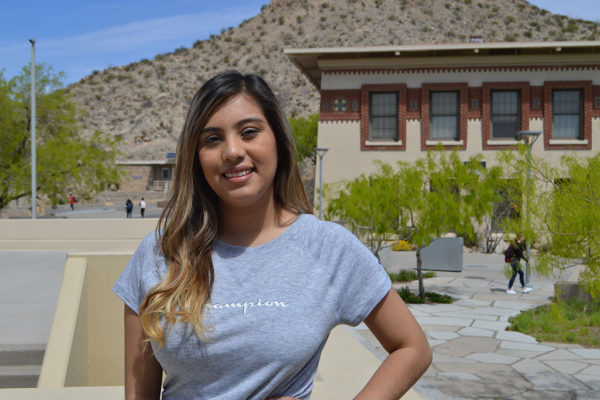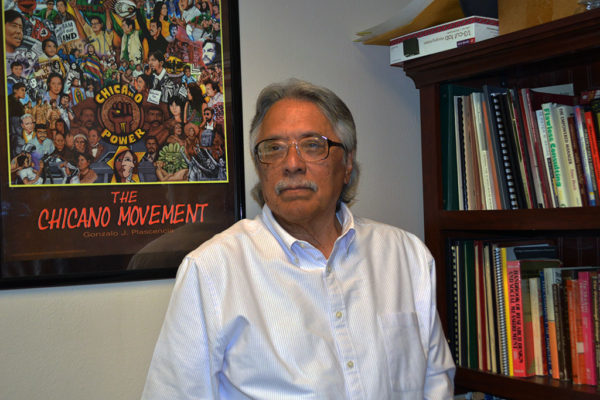EL PASO –For some young borderlanders, pocho is a word that unites two cultures.
“El Paso and Juarez is its own culture. We are neither entirely American and we are neither entirely Mexican so pochismo would be somewhat some of our language,” said Antonio Villaseñor, 23, a University of Texas graduate student and editor of the online magazine Con Safos.

Fernanda Ontiveros, UT El Paso sophomore. Photo credit: Ana Jazmin Herrera.
With outlets like Buzzfeed and we are mitú featuring videos on Youtube describing the experience of being a pocho in the United States and new clothing lines like the L.A-based Pocho wear, the term is being embraced by a new generation of Mexican-Americans.
“I see it as something positive. However, my family in Mexico don’t. They think we are forgetting the culture and the language,” said Fernanda Ontiveros, a sophomore at the University of Texas at El Paso.
The word pocho first emerged at the beginning of the 20th century, according to historians, after an increase in immigration to the U.S. by people who escaped the Mexican Revolution.

Carlos Ortega, Chicano Studies lecturer, UT El Paso.
“The word pocho has been historically used by Mexican nationals as a derogatory term to describe Mexican-Americans. The word has been associated with a person that has lost some sense of their identity, their culture, their language, and their heritage by being born and living in the United States,” said Carlos Ortega, a Chicano Studies lecturer at the University of Texas at El Paso.
“A pocho was not considered American enough because of his Mexican heritage but at the same time not Mexican enough because of his assimilation to the American culture,” Ortega said.
Some have experienced the negative perceptions firsthand.
“I remember constantly having children in our parents’ village back in Mexico asking a ver di esto en ingles. Show me your English. In other words, show me how less you have become one of us and how much you have become one of them,” said Estela Reyes, media relations officer for Centro de Salud Familiar La Fe.
The nonprofit organization provides healthcare services at multiple clinics in El Paso as well supports a preparatory school and cultural and technology center in Segundo Barrio.
“There is even a tape somewhere floating around the family of me as a six year old singing Old McDonald Had a Farm in my funky six year old English. I can hear laughter in the background and I think, ‘Wow, what a mean thing to do to a little six year old Mexicanita” Reyes said.

Sister Cities mural in downtown El Paso. Photo by Ana Jazmin Herrera, Borderzine.com
Despite past negative connotation, the word has evolved and a new generation of Mexican-Americans uses pocho with pride to describe themselves.
“While there would be broader cultural influence in relation to the first person that used the word pocho and decided it meant something negative, the fact that now it is perceived to be something more positive would be associated with a shifting identity,” said Iva Ivanova, a researcher in cognitive science and language at the University of Texas at El Paso.
“People reevaluated how they feel about themselves in relation to this word,” Ivanova explained.
Villaseñor proudly identifies himself as a pocho as he reflects on the future of the word.
“I think most importantly is the rhetoric behind the word. I know that what the word means and how the word is seen are very different, and so I think that is where we need to bridge the gap” he said..

